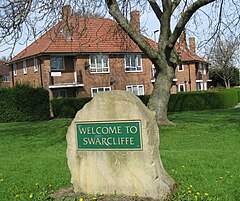Stanks
| Swarcliffe | |
|---|---|
 Boundary Stone,coming from Manston |
|
| Swarcliffe shown within West Yorkshire | |
| Population | 6,751 |
| OS grid reference | SE36543620 |
| Metropolitan borough | |
| Metropolitan county | |
| Region | |
| Country | England |
| Sovereign state | United Kingdom |
| Post town | Leeds |
| Postcode district | LS14 |
| Dialling code | 0113 |
| Police | West Yorkshire |
| Fire | West Yorkshire |
| Ambulance | Yorkshire |
| EU Parliament | Yorkshire and the Humber |
| UK Parliament | |
Swarcliffe, originally the Swarcliffe Estate, is a district of Leeds, West Yorkshire, England. It is 4.9 miles (8 km) east of Leeds city centre, and within the LS14 Leeds postcode area. The district falls within the Cross Gates and Whinmoor ward of the Leeds Metropolitan Council.
In the 1950s, the Swarcliffe housing estate was developed by the city council which built two and three-bedroomed semi-detached council houses, a number of three-storey blocks containing 12 flats or more, and three brick-built nine-storey blocks of flats. Two of the blocks of flats were demolished in the 1990s and an old people's home was built on the site. In 2007, the remaining block was demolished. The previous year, six of seven fifteen-storey high-rise blocks of flats, built in 1966 as part of the Whinmoor estate, were demolished.
Swarcliffe is served by Swarcliffe Primary School and Nursery, Grimes Dyke Primary School and St. Gregory’s Youth & Adult Centre. Stanks Fire Station provides a service to more than 42,452 people. Swarcliffe has a dwindling number of public houses and shops. Great and Little Swarcliffe Woods lie within the boundaries of the estate.
The area is being regenerated by Yorkshire Transformations; a private finance initiative, which is a partnership between Leeds City Council and two private sector companies: Carillion and the Bank of Scotland. The MP for the Leeds East constituency from 1955 to 1992 was Denis Healey who represented the Labour Party. He was succeeded by the present Labour MP, George Mudie. In 2009, the population of Swarcliffe and Stanks was 6,751, of which 4,544 were considered to be "hard-pressed", or experiencing financial difficulty.
...
Wikipedia

